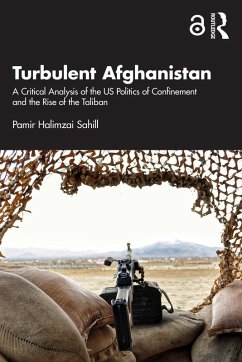
US Policy Towards Afghanistan, 1979-2014 (eBook, PDF)
'A Force for Good'
Versandkostenfrei!
Sofort per Download lieferbar
41,95 €
inkl. MwSt.
Weitere Ausgaben:

PAYBACK Punkte
21 °P sammeln!
Providing a study of US policy towards Afghanistan from the Soviet intervention of 1979 to the exit of US/International Security Assistance Forces combat troops at the end of 2014, this book examines how the United States' construction of its interests has shaped its long-term involvement with that country.Recognising that there is a particular focus on the United States' representation and justification of its Afghan policy, this work demonstrates how the intertwining of language and social practices provided policymakers' with a shared meaning on selling policy. In this way, Washington justi...
Providing a study of US policy towards Afghanistan from the Soviet intervention of 1979 to the exit of US/International Security Assistance Forces combat troops at the end of 2014, this book examines how the United States' construction of its interests has shaped its long-term involvement with that country.
Recognising that there is a particular focus on the United States' representation and justification of its Afghan policy, this work demonstrates how the intertwining of language and social practices provided policymakers' with a shared meaning on selling policy. In this way, Washington justified its practices - including covert operations, diplomacy, counterterrorism and war - as essential in ensuring that 'good' prevailed over 'evil'. Teitler's argument contrasts with the existing literature, which predominantly argues the United States has been motivated by self-interest in its dealings with Afghanistan. Teitler deploys a constructivist approach to elucidate US-Afghan relations in this critical historical juncture.
Through its particular use of constructivism, the work aims to contribute more broadly to international relations and US foreign policy scholarship. This book will be of interest to academics and students in various fields, including US foreign and security policy, international relations theory, the Greater Middle East, Afghanistan, American exceptionalism, constructivism and discourse analysis.
Recognising that there is a particular focus on the United States' representation and justification of its Afghan policy, this work demonstrates how the intertwining of language and social practices provided policymakers' with a shared meaning on selling policy. In this way, Washington justified its practices - including covert operations, diplomacy, counterterrorism and war - as essential in ensuring that 'good' prevailed over 'evil'. Teitler's argument contrasts with the existing literature, which predominantly argues the United States has been motivated by self-interest in its dealings with Afghanistan. Teitler deploys a constructivist approach to elucidate US-Afghan relations in this critical historical juncture.
Through its particular use of constructivism, the work aims to contribute more broadly to international relations and US foreign policy scholarship. This book will be of interest to academics and students in various fields, including US foreign and security policy, international relations theory, the Greater Middle East, Afghanistan, American exceptionalism, constructivism and discourse analysis.
Dieser Download kann aus rechtlichen Gründen nur mit Rechnungsadresse in A, B, BG, CY, CZ, D, DK, EW, E, FIN, F, GR, HR, H, IRL, I, LT, L, LR, M, NL, PL, P, R, S, SLO, SK ausgeliefert werden.













